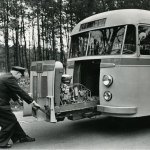My heavy tow package 3.73 ratio 2019 Expedition with the 10spd runs between 1600-1900rpm on typical highway trips. 75mph its in the 1900ish range.
Yep! Better cruise rpm for diesels for sure!
My CRD has the Mercedes OM642 (Sprinter engine, no Bluetec/DEF) with a torque peak @ 1900rpms. Like yours, that's where the rpm should be at cruise. In the case of these Jeeps, using the Hemi's 545RFE transmission would have been a much better choice than the Mercedes 722.6/NAG1 transmission it has. Just doing that would have given it the gear ratios needed to cruise at a proper lower rpm level, since the only axle ratio available was a 3.73. One fun thing is that since I've increased the tire size, the cruise rpm has gotten closer to 'the ideal'! haha! I currently cruise about 2100rpm @ 65mph.
As I'm sure most know, you typically want to gear the vehicle to cruise near an rpm that compliments it's engine's torque peak rpm, for peak highway mileage. That torque peak is where an engine is running at it's most efficient point. These days, keeping the RPM close to it's torque peak at all times is also why we're seeing more gear speeds for engine/transmission packages in general. The OEM's are trying to keep the engine running as close to it's max efficiency point as possible, to bring the economy numbers up as much as possible.




